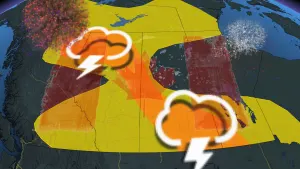
‘This is going to be a challenge’: Do I have the flu or COVID?
Medical expert weighs in on some fundamental differences between COVID-19 and the seasonal flu
As the seasons change, so is our reality living in a world with COVID-19. The surge in numbers is not only alarming but will create larger confusion as we go into flu season.
There are many overlapping symptoms between COVID-19 and the seasonal flu, and doctors warn this will pose problems when assessing patients.
“The two viruses have very similar presentations in how they affect people.” says Dr. Vanessa Meier-Stephenson, a virologist in Calgary. “Both viruses can cause fever cough, shortness of breath, stuffy nose, muscle aches, overall unwellness and low energy.”

Dr. Meier-Stephenson adds, however, that doctors are monitoring a few key differences.
“One distinguishing feature with coronavirus is a loss of sense of smell and sense of taste,” she says. “It’s somewhat unique to this versus influenza -- and this is outside of the sinusitis stuffy nose sensation.”
RELATED: What fall means for COVID-19
“However, I have had people ask me if they check themselves each morning to see if they can smell flowers or soap or incense, is that a good screen to rule out coronavirus? And the answer is no -- not everyone will lose their sense of smell -- up to two-thirds in some studies, but for some it can be an early sign.”
Another key difference is how the virus presents itself in children. Both of these viruses can be serious in children. When someone under 5 years of age is infected with influenza, they usually need to be hospitalized. The most severe cases of the flu usually occur in people over 65 or under 2 years old.
If a child contracts COVID-19, they may display some very unusual inflammatory symptoms -- this would not happen if infected with influenza.
“We have noticed that there has been a new syndrome, or increase in rates of this kawasaki disease like syndrome known as MISC or multi system inflammatory syndrome,” Dr. Meier-Stephenson explains.

Source: Medscape
Another similarity is the fact that both these viruses can be spread before anyone feels any symptoms at all. People usually feel the effects of the flu quicker than they would COVID-19. If you are infected with the flu, symptoms usually appear in 1-4 days, according to the CDC. With COVID-19, people usually show symptoms around 5 days but can be delayed as long as 14.
Because of the uncertainty, Dr. Meier-Stephenson says it’s best that people just stay home if they feel unwell.
WHAT TO DO IF I FEEL ILL?
The only option to rule out COVID is to get a test. Many populations across Canada have realized that there is a new surge in the demand for testing and appropriate measures are being put in place. For example in Ontario 60 pharmacies will now perform COVID-19 tests as of Friday September 25th.
While there have been many advancements on a potential vaccine for COVID-19, there still isn’t one reliable enough for mass consumption. However, the seasonal flu has a vaccine in production every year and doctors are saying the flu shot this season could bring bigger benefits than ever before.
As we head into the winter months keeping on top of your health is crucial. You may want to consider adding more zinc, vitamin C and D into your diet in order to keep your immune system working properly.
Be sure to watch the video that leads this article for more information on how to spot the difference between influenza and COVID-19.










